2024 was a wild year. From selling my first book, Good People, to moving back to the US, this year has been one of monumental change. When looking back on the past twelve months, it’s always helpful for my writing life if I take stock of the stories that helped me become a better writer. This year, I worked to hone my writing skills in three craft areas: (1) plot, (2) tension, and (3) humor. For plot, my goal was to create simple but specific external goals for my protagonists. As for tension, my goal was to consistently deliver inevitable and propulsive consequences for my characters. Lastly, when it came to humor, my goal was to improve my joke writing in dialogue so that my characters could more effectively spar with words as they attempted to win, stop, escape, or retrieve their external goals.
Looking back on this year and my writing goals, five stories stand out as key influences on my writing life. Today we’re breaking down the media1 that helped me become a better writer and how these stories might improve your writing life. You know what to do: take what’s useful; leave what’s not.
Update for Paid Subscribers
Paid subscriptions return on January 1, 2025. If you had an active paid subscription before the pause on August 4, 2024, please make sure your payment method is up-to-date. Feel free to reply to any Craft with Kat email if you have any questions!
Craft with Kat’s 2024 Media Wrapped
1. TV Show — Comedy

Star Trek: Lower Decks
Lower Decks is an adult animation series set in the Star Trek universe that follows the hilariously unglamorous lives of low-ranking crew members in Starfleet.
While working on Good People, one of my revision goals this year was to punch-up the humor in its dialogue. Lower Decks has excellent dialogue that couples laugh-out-loud comedy with character agency. Every character in the show from the A Story protagonist to the C Story side characters have concrete external goals, and they use their witty banter as a tool to help them achieve their goals. If you’re a dialogue-heavy writer or interested in adding more humor to your stories, you will get a lot of value out of watching this show even if you’re not a Trekkie.
I was a big Rick & Morty fan back in the day, but living in South Korea and consuming Korean content made me more interested in wholesome storylines driven by sincere interactions between characters. If you ever wanted an over-the-top cartoon like Rick & Morty but with less yelling and more sincerity, Lower Decks is the show for you.
Hello alien people . . . I’d be happy to hand you all your asses, but right now, we’re on a deadline, so how about, instead of fighting, the next five rounds are on me?
— Ensign Mariner, breaking up a bar fight (Season 1, Episode 2)
2. TV Show — Drama
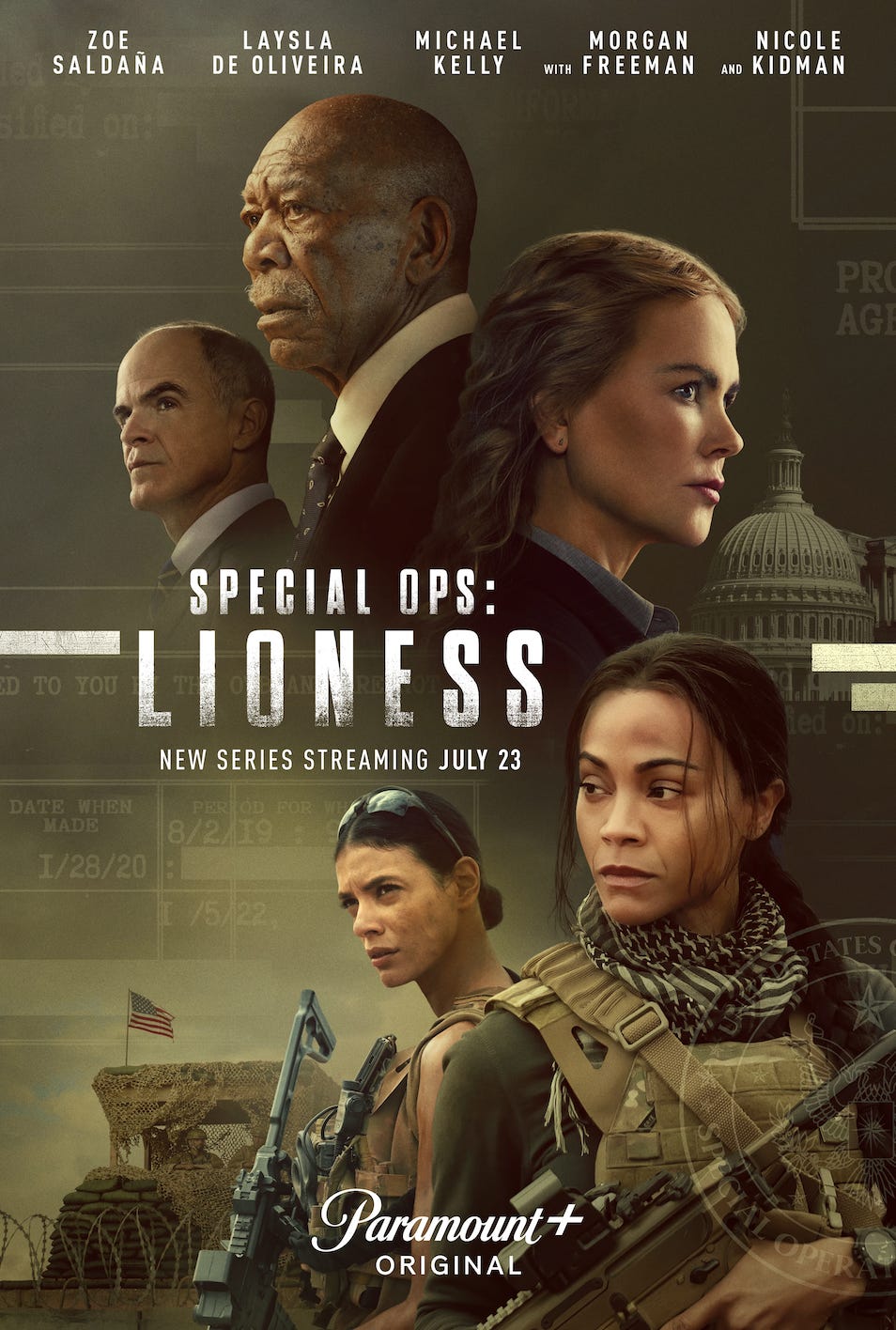
Lioness
The Lioness program is a covert CIA operation in which female operatives infiltrate organizations that threaten US national security. Each season, Joe (Zoe Saldaña) trains and embeds a new lioness to dismantle threats to the United States.
Taylor Sheridan—the showrunner—is truly a storytelling GOAT. In every story he writes, Sheridan comes out the gate and says, “Fuck exposition. We got lives to save.” By prioritizing his characters’ scene-level external goals and presenting clear consequences for failure, Sheridan creates a seamless immersion experience for his audience. In recent years, my writing has been leaning towards a slow burn in terms of pacing. While there’s nothing wrong with a slow burn, I started Good People in 2015. Back then, my storytelling sensibilities were more fast-paced and interested in loud story beats that brought down significant consequences. Lioness helped me transition back into the in-your-face mode of storytelling that my twenty-year-old self prioritized in early drafts of Good People. If you’re writing quiet stories and struggling with creating tension and obstacles for your character’s desires, anything in Sheridan’s filmography will teach you how to create metaphorical life-or-death stakes in your otherwise “quiet” stories.
At face value, you might think, “Well, Sheridan often writes about war, so of course he can easily create life-or-death stakes.” But there is so much more going on in the interpersonal relationships of his characters that you can learn from. For my writing, the central question of Good People is: can Jo win a prestigious scholarship or not? The stakes in the book aren’t literally life or death, but Taylor Sheridan’s work has helped me create tension as if Jo’s life were literally at stake. Without exaggeration, Lioness has some of the best storytelling I’ve seen on television in many, many years.
It’s like fighting a f—king raccoon.
— Sergeant Hastings about sparring with a Lioness (Season 1, Episode 1)
3. Book
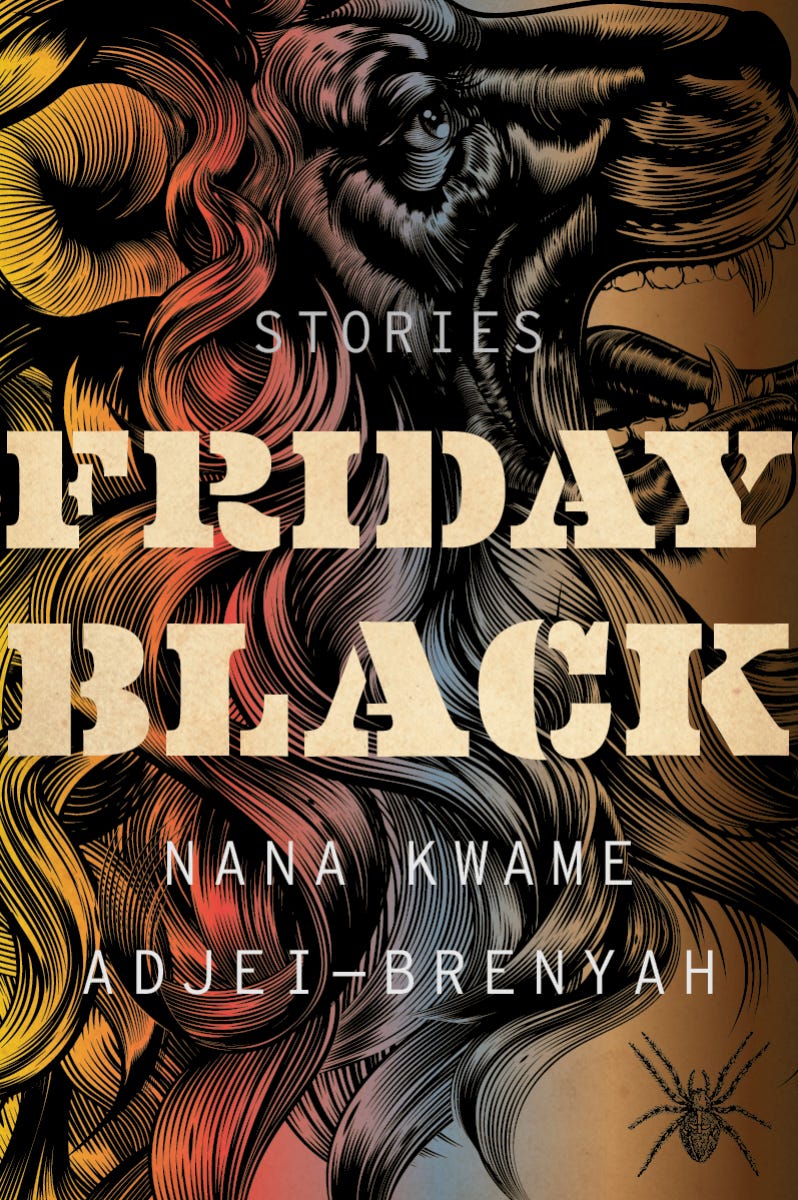
Friday Black
This story collection had been on my TBR list for several years. I first encountered Nana Kwame Adjei-Brenyah’s work in the 2019 edition of Best American Short Stories. His story, “The Era,” was included in the anthology, and its worldbuilding and juxtaposition of external plot against internal narrative captivated me so much that I often reference it in my craft lessons.
When I moved back to the US, I picked up Friday Black as my first read in America, and this story collection completely revolutionized my approach to using humor amid serious subject matter. In between drafts of Good People, I also spent much of this year revising You Will Survive This—a novel that features a lot of physical conflict—and the fight scenes in “Through the Flash” helped me better represent violence and combat in my own work.
Friday Black is perfect for writers looking to (1) simplify their worldbuilding and (2) use humor to defuse or amplify conflict in their work.
Interested in more book recommendations? Check out our post about 2024 debut writers.
“Suck one and die,” says Scotty, a tall, mostly-true, kid.
– “The Era” by Nana Kwame Adjei-Brenyah
4. YouTube Channel
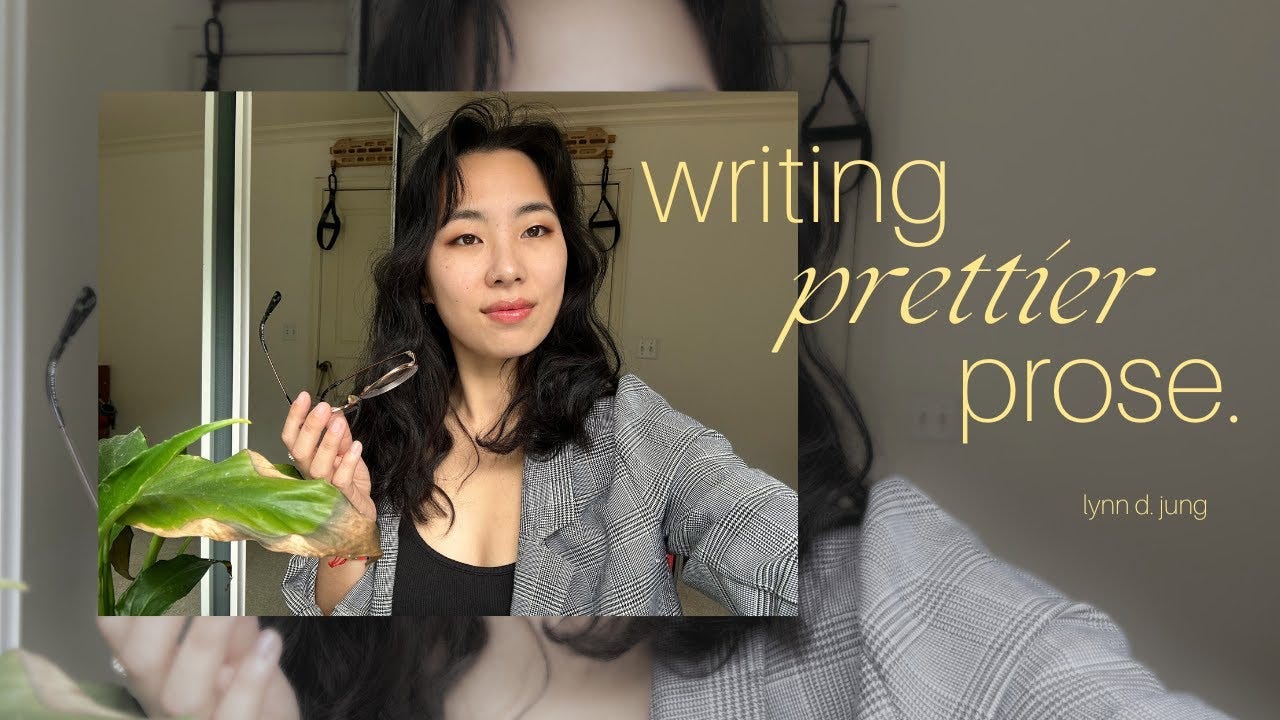
Lynn D. Jung
Lynn D. Jung is a sci-fi and fantasy writer and a good writing friend of mine. Her YouTube channel documents her writing career and offers concrete craft lessons on things like worldbuilding, character arcs, and revision. This year, while working on Good People, I spent a lot of my time revising my manuscript on the line level. One of my favorite videos on Lynn’s channel is “How to Write ‘Prettier’ Prose and Elevate Your Writing.”
If you’re looking for video resources to add to your writing toolbox, I highly recommend checking out Lynn’s YouTube channel.
Read out loud to [yourself] . . . one of the best ways to develop “your voice” is to hear your voice saying your words and figure out what sounds good and what doesn’t.
— Lynn D. Jung on elevating line-to-line writing
5. Video Game
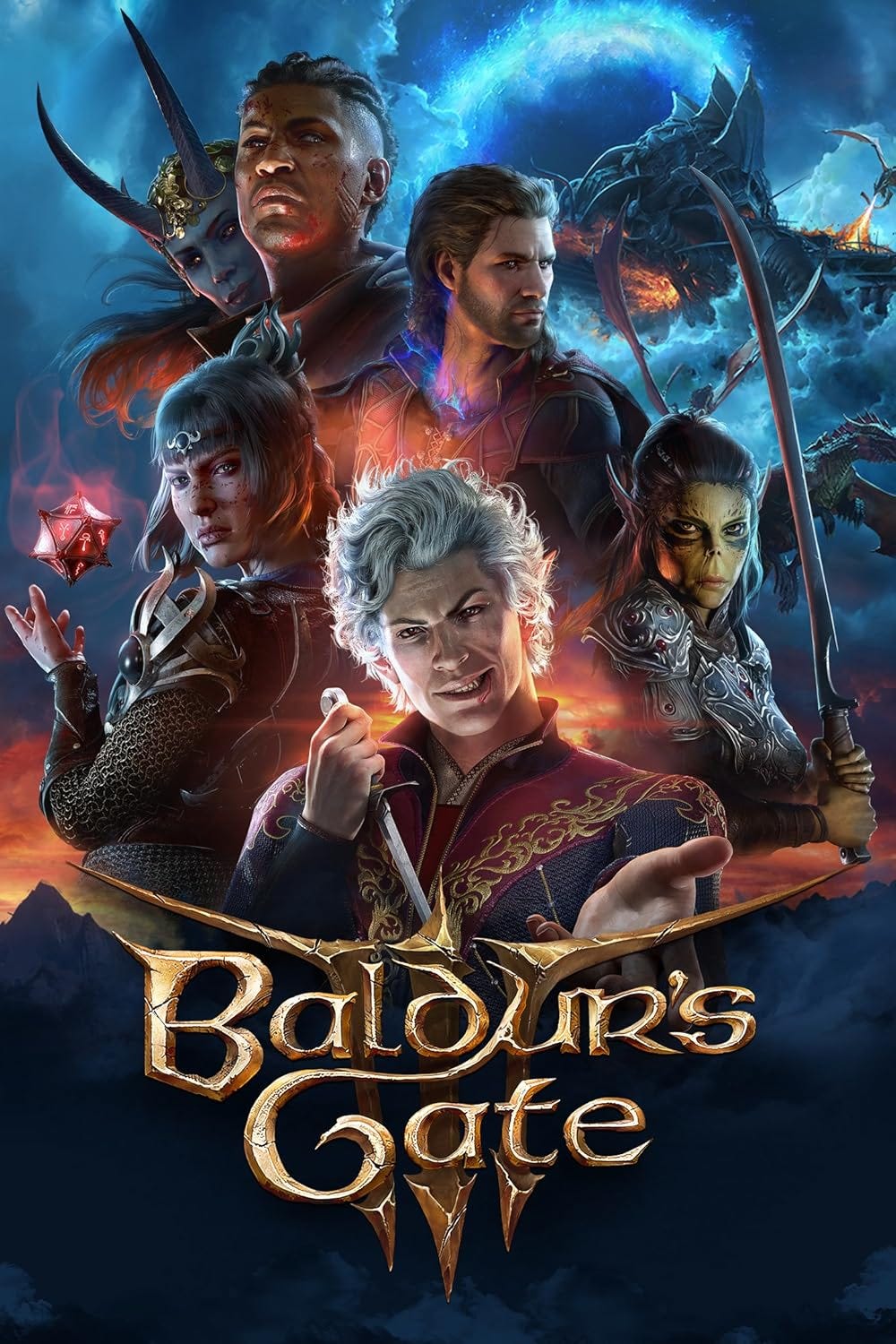
Baldur’s Gate 3
After being abducted by Mind Flayers—a race of evil squid-people—the player and their companions must remove a parasite from each of their heads before they’re turned into Mind Flayers.
As a writer, I’ve always been good at setting up precarious situations for my protagonists, but in early drafts, my protagonists often solve their initial problems too quickly. This craft issue stems from the fact that I haven’t mastered creating consequences for my characters yet. In an effective story, a character takes an action to get closer to achieving their goal, but a consequence creates a new problem and a new short-term goal for the protagonist to win, stop, escape, or retrieve. I strongly believe Baldur’s Gate 3 won Game of the Year because it masterfully creates severe consequences for every action the player takes.
Whenever I first play an RPG, I don’t look up the outcomes for the decisions I make in the game. While playing, I prefer to organically make decisions as I would in real life, consequences be damned. In my first playthrough, I entered the Tiefling refugee camp at the beginning of the game. Goblins had just attacked the camp, and one goblin is being held in prison. I approached the goblin’s cell as Arka, a young Tiefling, tries to muster the nerve to avenge her brother and kill the captured goblin. In this moment, the game presents the player with three options: (1) talk Arka down from killing the caged goblin, (2) let Arka kill the goblin, or (3) attempt to read Arka’s thoughts. I ultimately wanted to stop Arka from killing the goblin, but after reading the last option, I was like, “Mind reading is cool. Let’s do that.”
The game then had me roll a twenty-sided die. If I got a fifteen or higher, I could successfully read her thoughts. But I rolled a ten. Arka immediately became hostile and said something along the lines of, “Are you trying to read my thoughts? How dare you!” With the help of her friend, she attacked me. I tried absolutely everything in my power to diffuse the situation, but nothing worked; I ultimately had to kill her in order to survive myself. While I achieved my short-term goal of stopping Arka from killing the goblin, the consequence of my choice to read her mind was that I had to kill a young woman who was grieving the loss of her brother. This consequence legitimately made my stomach turn, but I’m a purist, so I won’t save scum and reload to make different choices. In the end, I had to live with myself knowing that my character killed a relatively innocent person to let an objectively evil goblin live. This anecdote is just one of many excellent consequences that Baldur’s Gate 3 creates for player choice.
As of today, I’ve logged over 500 hours into BG3, and playing this game has taught me to ask myself four questions while writing a scene:
What is my protagonist’s short-term goal for this scene?
What concrete action do they take to achieve their goal?
What is the consequence of their action?
How does that consequence create a new short-term goal?
Even if you’re not a big gamer, playing just two hours of Baldur’s Gate 3 will teach you how to write more effective scenes wrought with tension and concrete consequences.
Sweet that you care enough to murder me. Mind if you don’t?
— Gale Dekarios, Baldur’s Gate 3
What’s in Your 2024 Media Wrapped?
What books, movies, and TV shows helped you become a better writer this year? What YouTube channels do you turn to to learn more about writing craft?
What were some of your writing goals for 2024? How are they changing for 2025?
Tell us all about your writing life in the comments:
Virtual Write-In Next Week!
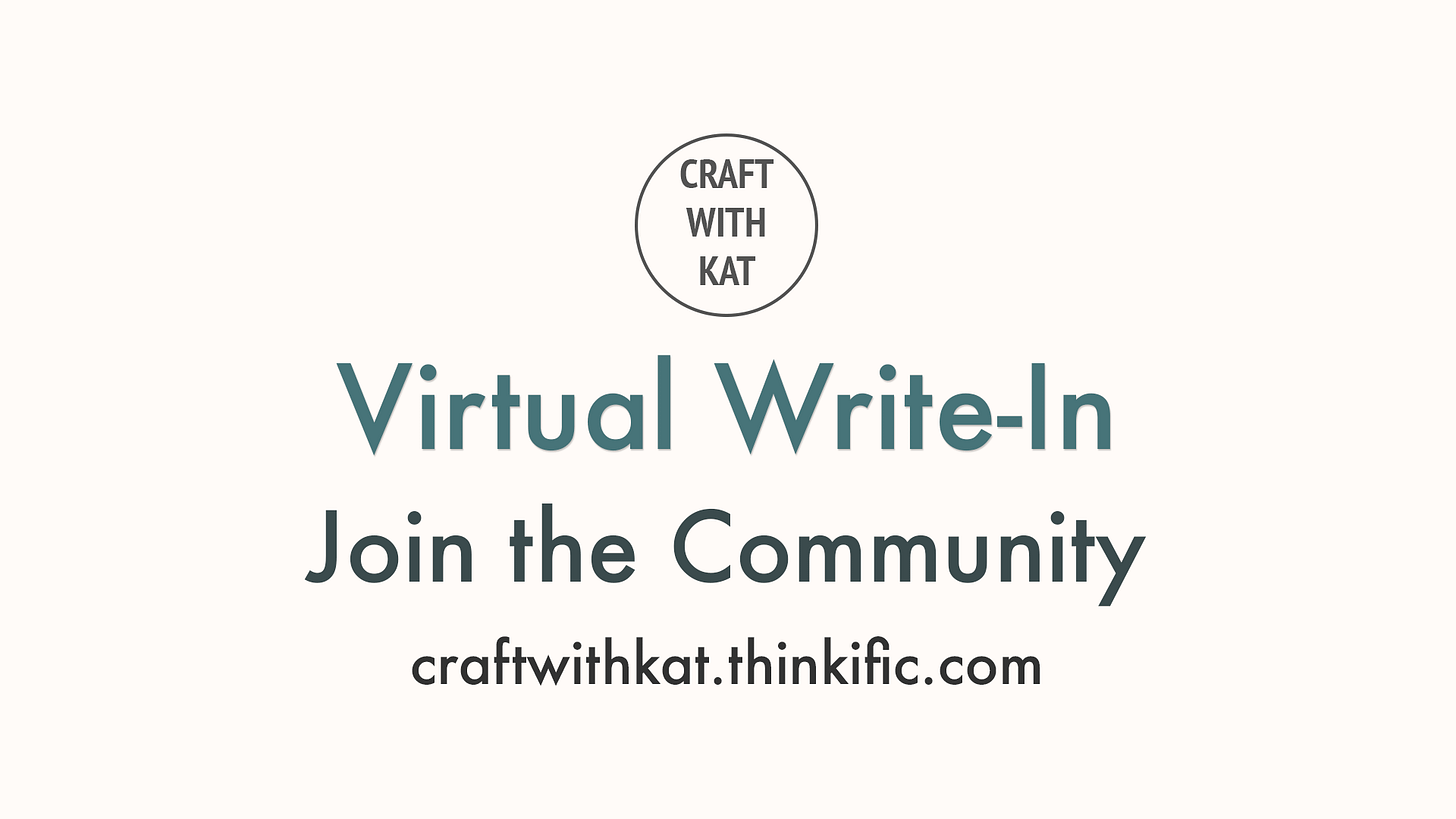
Our first virtual write-in is this Saturday, January 4th at 1 PM EST. RSVP here to receive the Google Meet link. This live event is free to all. We’ll be setting writing intentions and using the Pomodoro Technique to achieve our writing goals. I’m so excited to e-meet you all next week!
Until then,
Kat
Not sponsored. Just a fan.




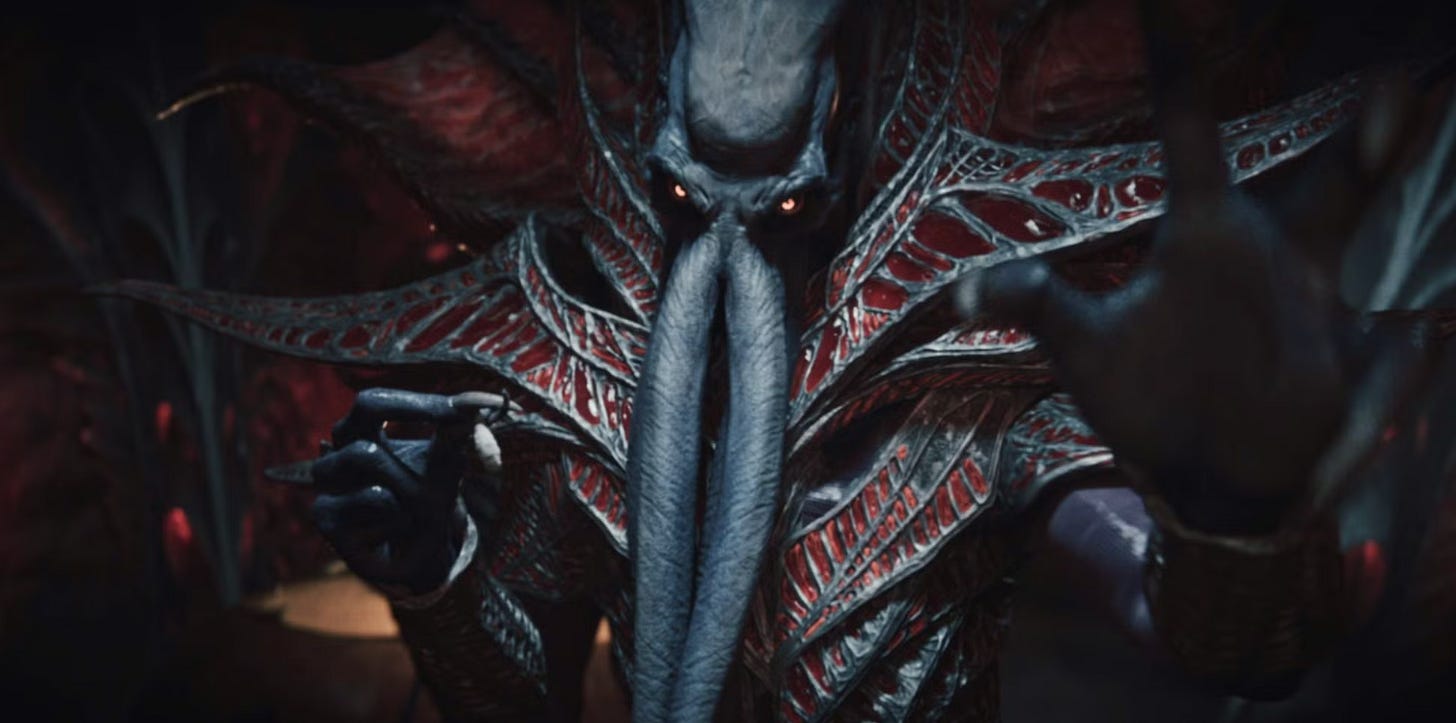
Welcome back to the States, Kat! I hope you're getting settled. I love this piece because it has already sparked ideas for me to consume more...but with intention! My son is the gamer in the family, and he loves BG3, so I want to get his thoughts on your write up (and I'm fortunate that he'll humor me by talking about writing with me. :) ).
My writing wrap up: well, I didn't write much fiction at all after about March, though I did have a renewed bump in September/October. I have this idea I've been toying with, and shelving, for years, and I just can't seem to give it any legs.
BUT...I have been writing more regularly on Substack. I started a new series called Tennis is Life where I talk about things I've learned from learning to play tennis as an adult and how what I've learned on the court translates to life off the court. It's the first time I've really felt like what I'm writing has my heart in it and even though 2024 was an exceedingly busy year for me, I looked forward to taking the time to do my articles every 10-14 days or so. Anyway, it's good and I'm excited.
AND Then...you put out a post about last minute gifts a few weeks ago. I read through that and immediately bought Story Genius (so my husband could give it to me for Christmas ha!). I have been devouring this book this week and am making some great headway on understanding my protagonist from my original novel so that I can do a re-write (that's what I was working on the first part of 2024) with some heart.
Needless-to-say, I'm energized about writing right now, and you're a big part of that, Kat. So, thank you! I'm disappointed that I'll miss the virtual write-in next week, but we'll be traveling so I'll get the next one!
This has been a self-indulgent comment from me, but I do appreciate what I've learned from you and it's great to hear from you. I'm excited about your book update, and can't wait for what 2025 has in store!